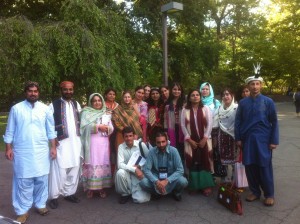
These 17 teachers participated in a federal government program to expose foreign professors to the education system of the United States. Their visit was supported by the Office of International Education.
For the past several weeks at CSU Chico, teachers from five provinces in Pakistan have been learning about life and education in the U.S.
Their study abroad was part of the Teaching Excellence and Achievement Program, funded by the U.S. Department of State and administered cooperatively with CSU Chico’s Office of International Education.
The program is designed to share classroom strategies with instructors from other nations like Pakistan, as well as provide an introduction to cultural lifestyles in the U.S.
“Besides getting professional developmental training, we came for cultural exchange,” said Rani Gul, one of the Pakistani instructors.
On campus, the 17 Pakistani instructors sat in on lectures and received training seminars designed by Chico State professors.
When they weren’t at Chico State, the group worked with students at high schools in Oroville and Hamilton City for field experience training, and toured high school campuses in Sacramento and San Francisco to experience the differences between urban and rural education
“They’re wonderful,” said Bethany Pinegar, who spent much of her time with the group as the program manager. “They’re thoughtful. They’re engaged. They’re curious.”
Sheri Ahmed, another Pakistani instructor, noted that education appeared to be a priority in the US.
In Pakistan, 1.9 percent of the nation’s gross domestic product has been allocated towards public education, according to an article published by the Express Tribune. The global standard is double that, at 4 percent, according to the article.
Ahmed said he hopes to apply the training they’ve received to improve the quality of teaching back home.
“Nations are constructed by their educators,” Ahmed said. “If we can cross the education limits, we can progress.”
The group presented a panel discussion in Ayres Hall Tuesday afternoon to speak to the attendees about contemporary Pakistan, the state of its public education system, and their experience living as guests in the US.
The panel was part of a semester-wide series of presentations held at Chico State called the International Forum.
“Through the forum, students can gain increased exposure to whatever’s going on in the international scene,” said Quirino De Brito, the event coordinator and faculty for the International Languages, Literatures, and Cultures Department. “The forum tries to foster an awareness of the multitude of issues taking place overseas.”
Cultural exchanges like the ones facilitated through the panel are important to understanding our own culture, Pinegar said.
“Most of the time, we go through our days not being aware that our culture isn’t the only one in the world,” Pinegar said, “When you’re faced with something that is different, it makes you realize that you do things in a particular way that you’re used to.”
Pakistani and U.S. media has helped to foster many misconceptions about both cultures, Gul and Sheri said.
Among those misconceptions about American culture are that the youth do not respect their elders and instructors, that they are rude and cruel and that they are killers, Gul said.
“Through media and movies, we got your culture very different from the experience here,” she said.
On the contrary, both found the people to be friendly, describing Americans as “loving,” “disciplined” and “civilized.”
“We love Americans,” Ahmed said. “They way they speak, the way they smile, the way they have met us, and the way they’ve honored us.”
On Oct. 7th, the group will say goodbye to the Chico State, heading to Washington D.C. before returning home.
Mozes Zarate can be reached at [email protected] or @mzarate139 on Twitter.








